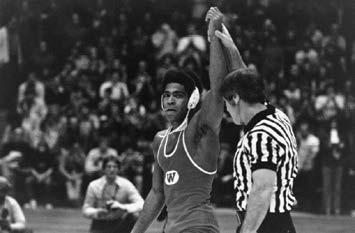
4 minute read
Lee Kemp Shares a Message of Resilience
Back Where He Belongs
Decades after his Olympic dream was crushed, Lee Kemp shares a message of resilience
Advertisement
BY JANE BURNS | PHOTO BY JIM NEWBERRY
ee Kemp (BBA ’79, MBA ’83) has a message for anyone who will listen. And though he made his name in sports, the former world champion wrestler’s message goes far beyond that.
It’s about resilience. It’s about dealing with disappointment. It’s about changing course and moving on. It’s about having a Plan B, a Plan C, a Plan D, and then maybe finding a way back to Plan A.
Kemp was an Olympian, an Olympian who didn’t get to go to the Olympics. Favored to win a gold medal in 1980, Kemp instead stayed home with 465 other athletes when the U.S. boycotted the Moscow Games. It’s a situation familiar to this year’s Olympians, who have to wait until 2021 after the Games were postponed due to the COVID-19 pandemic.
“Adversity hits us all, just like the rain falls on us all,” says Kemp. “Sometimes we cause our own pain, but sometimes we’re innocent bystanders who just get zapped.”
Not only is Kemp the best to ever wear a Badgers’ wrestling uniform, he’s one of the best ever in the nation. Fewer people recognize his greatness as time goes on because of that boycott, the missed gold medal, and the shape Kemp’s post-athletic career L
could have taken. Until the 1990s, the Olympics were for amateurs only. Publicity after winning gold was the only way to earn a living through sports.
“I thought I’d be on the Wheaties box making money as an Olympic champion,” he says. “Wrestling doesn’t bring a lot of money, but my dreams after that had come with the hope of winning a gold medal.”
Last year, a documentary about his life was released, Wrestled Away: The Lee Kemp Story. The filmmaker had approached Kemp after hearing his story. Kemp was a little hesitant, but agreed. “It’s kind of embarrassing when a movie about your life will reveal the most unpleasant and devastating things that have ever happened to you—and then you’re trying to sell it,” Kemp says.
The documentary tells the story of Kemp’s youth, wrestling career, business career, personal and professional challenges, and finding his way back to the sport he loves. Kemp used the skills he learned from his undergraduate degree in marketing to help get the film made and promoted.
Kemp won three NCAA titles as a Badger. From there he won three world championships and Olympic glory was on the horizon. Then in March 1980, President Carter announced that the U.S. would boycott the Moscow Olympics because of a Soviet invasion of Afghanistan.
“If you’re not a sports person, it might not seem like a big deal. I don’t want to give the impression that sports is the most important thing in the world, but to me, it was a tragedy,” Kemp says. “It blindsided all of us. We all had to get back up and be resilient.”
Kemp continued to train in Madison, this time for the 1984 Olympics. He also went back to school for his MBA.
“I felt I needed to do something that someone couldn’t take away from me, and that was my MBA,” he says.
Kemp didn’t qualify for the 1984 Olympics. With his Olympic dream over, he moved ahead with his business career.
“Having a business education opened a lot of doors for me,” he says. “I was always able to get a good Lee Kemp won three NCAA championships while wrestling for the Badgers. UW Archives (ID S15081)

job with good companies because of my degrees.”
He worked in Chicago at Burrell Communications, a pioneering multicultural marketing and advertising firm. He also worked as an associate product manager for Clairol in New York.
Through a UW–Madison contact, a Ford Motor Company executive reached out to Kemp about the company’s dealership program. Intrigued by the opportunity to run his own business, he signed on.
“Talk about marketing, wow. You wear all the hats there,” he says. “You’re young, you’ve got energy, and confidence. You take it and go.”
He took a struggling dealership in

—LEE KEMP (BBA ’79, MBA ’83) Forest Lake, Minnesota, and turned it into one of the top dealerships in the Twin Cities metro area. It was named four times to Black Enterprise’s list of Top 100 minority dealerships in the U.S. Yet the troubles of the auto industry in the 2000s forced Kemp to sell, and with the loss of his business Kemp was left searching for the next professional chapter in his life. It came in the form of a previous chapter: wrestling.
A friend suggested he apply to be a wrestling coach for the 2008 Olympics. Kemp thought that was a fool’s errand since he had been out of the sport for so long, but he earned a spot with the U.S. national team in 2006 and became one of two coaches selected to lead the team for the 2008 Games.
Now he’s fully back in the sport he had left behind. He lives in Sacramento, California, where he started a wrestling club and does speaking engagements. He imparts a message of inspiration to not just sports audiences, but organizations and businesses, too.
“All these interconnected things led to where I am now, and it’s overwhelming when I think of it,” he says. “With speaking and coaching, I want to inspire people. I’ll be doing something like this for the rest of my life.” •






